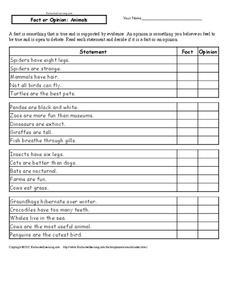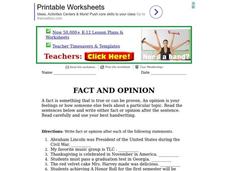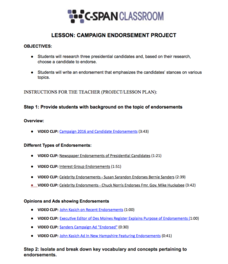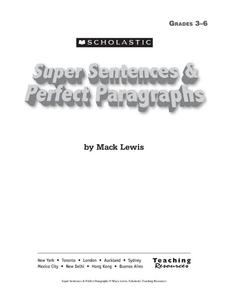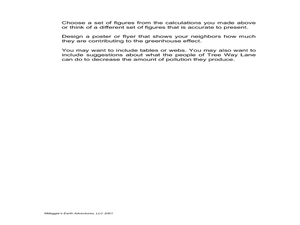Curated OER
Fact or Opinion: Animals
How many legs do spiders have? Is that an opinion, or is it a fact? Complete a worksheet with four sets of five questions about different animals and their attributes, noting whether each statement is a fact or an opinion.
Curated OER
Fact or Opinion (Food)
In this language arts worksheet, students read about the difference between fact and opinion. Students then read 10 statements about food and write "fact" or "opinion." Students write 3 facts about food and 3 opinions.
Curated OER
Fact and Opinion
In this fact and opinion instructional activity, students review the difference between fact and opinion and then identify 10 sentences as either fact or opinion.
The New York Times
Evaluating Sources in a ‘Post-Truth’ World: Ideas for Teaching and Learning about Fake News
The framers of the United States Constitution felt a free press was so essential to a democracy that they granted the press the protection it needed to hold the powerful to account in the First Amendment. Today, digital natives need to...
Curated OER
Writing a News Article
Join the newspaper business with a series of lessons and exercises focused on elements of journalism. The packet focuses on distinguishing fact from opinion, writing effective headlines, sequencing events, and editing and...
Curated OER
Persuasive Writing Skills Worksheets
What makes you want to buy that new car? Or vote for that popular politician? Study the persuasive techniques commonly found in advertisements or argumentative writing, including repetition, exaggeration, and fact vs. opinion.
Curated OER
Fact and Opinion
In this writing worksheet, students identify and describe the difference between a fact and an opinion. They place the cut-up words from the house ad in the correct column to indicate if they are fact or opinion.
Curated OER
Fact and Opinion
In this fact/opinion worksheet, students write either fact or opinion after a set of 10 statements, then record their score out of 10.
Curated OER
In Legal Limbo
Newspapers are great learning tools. They act as a conduit for current events, reading comprehension, and critical thinking. Here, pupils read a New York Times article regarding US immigration law under the Obama administration and...
Curated OER
The Value of Facebook
Does Facebook actually have any value? Find out what the New York Times thinks by reading this informational article. Learners use the 10 guiding questions to aid them as the read the provided article regarding the value of Facebook. Two...
Education Bureau of Hong Kong
Evaluating Casual Claims
Responsible decision making relies on the ability to a recognize, analyze, and evaluate claims. The worksheets and activities in this 32-page packet teach learners how to distinguish among opinions, reasoned arguments, facts, and logical...
Scholastic
Reading Skills Profile
Assess your young learners' reading skills, from sounding out words to general comprehension and identifying facts vs. opinions, with this excellent worksheet. The resource also includes a goal-setting worksheet that focuses...
Education Bureau of Hong Kong
Fundamentals of Critical Thinking
Analyzing arguments is key to critical thinking. Colorful slides teach viewers how to recognize the structure of an argument, the claims, and the validity of the evidence used to support an argument. Then, provided scenarios permit...
C-SPAN
Campaign Endorsement Project
So many politicians, so many endorsements! Learn to differentiate between facts as well as the process of endorsements with an informative resource. Class members watch current endorsement videos, research candidates from three different...
Scholastic
Super Sentences & Perfect Paragraphs
An extensive collection of lessons and activities includes many writing, grammar, and proofreading exercises. With templates and worksheets that cover several steps in the writing process, from sentence to paragraph to essay, this...
Scholastic
Persausive Writing
A unit on persuasive writing guides elementary learners through the writing process. The first part examines the elements of persuasive writing, including expressing an opinion, connecting ideas, using supporting facts, and writing...
Scholastic
Making Judgments Practice
Encourage young learners to identify persuasive writing techniques in a text with this resource, which includes two multiple-choice worksheets with advertisements for students to analyze.
Curated OER
Student Opinion: What Teacher Do You Appreciate?
This online resource is composed of a writing sample about teacher appreciation and a writing prompt for learners. You could use this as an in-class journal activity or you could have class members post their responses on the New...
Mr. Nussbaum
THE Founding Father
Who is the founding father—George Washington, Thomas Jefferson, or Benjamin Franklin? Scholars decide which of three early Americans, should be crowned the founding father of America based on research. Then, they compose a persuasive...
Saylor Academy
Persuasive Techniques
Want to safeguard your students against peer pressure? Teach them all about rhetorical appeals, common attack methods, and various argument tones with a reference sheet on persuasive techniques.
San José State University
Writing Concisely: Deleting or Replacing Unnecessary Information
Are you actually feeling really tired of reading wordy, redundant, long, lengthy sentences practically all the time over and over again? Introduce writers to this handout and exercise to teach to tighten up their prose! Provides two ways...
Curated OER
Carlyle Figures It Out
In this money worksheet, students read a passage titled Carlyle Figures It Out and completes word problems about it. Students complete 2 word problems and answer 2 opinion questions.
Curated OER
Produce a Nonfiction Text
For this language arts worksheet, students look for the facts and create several nonfiction texts while including useful information for the reader.
Curated OER
Reading Comprehension Worksheet
For this reading comprehension worksheet, learners read and answers questions. Students read a short passage and answer five questions about what they just read.
